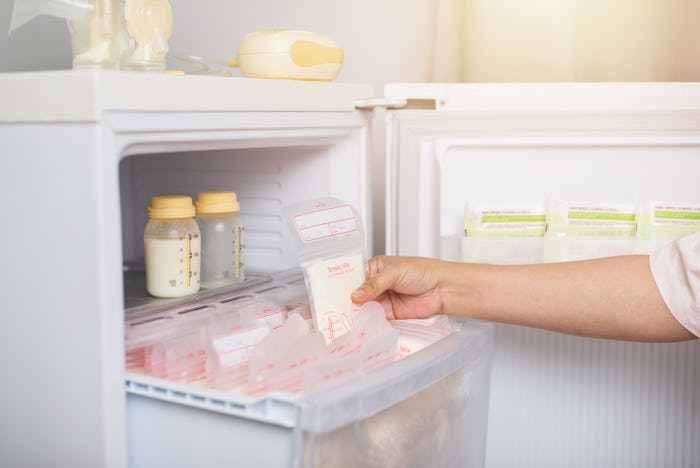Breastfeeding

Here’s The Deal With Frozen Breast Milk & Freezer Burn, According To Experts
How to prevent it, and whether it’s safe to feed to your baby.
If you’re breastfeeding, you’ve probably learned as much as humanly possible about pumping, storing, and reheating breast milk, maybe even before your baby was ever born. But the more specific ins and outs of breast milk storage, like knowing whether or not breast milk can get freezer burn, is probably not something you read up on. That is, not until you’re staring down a couple bags of liquid gold you’ve just unearthed from the very back of the freezer and find them covered in icy crystals.
Can breast milk get freezer burn?
“Breast milk is food. Any food can get freezer burn,” says Danielle Downs Spradlin, IBCLC, CLC owner of Oasis Lactation Services.
Freezer burn occurs when moisture leaves food that is frozen and turns into ice crystals on the exterior of the food, thereby dehydrating and oxidizing it, according to a report by The Kitchn. “Freezer burn can happen to any food, due to drying out and oxidation,” says Lynnette Hafken, MS, IBCLC with Rockville Lactation and the Fed is Best Foundation. “Oxidation is the chemical reason responsible for turning sliced apples and avocados brown.”
This can certainly occur with breast milk just as easily as it can with other foods stored in the freezer, considering that breast milk can be kept in the freezer properly stored for up to six months, according to the Centers for Disease Control and Prevention (CDC).
How to avoid freezer burn on breast milk
How can you keep your stash of frozen liquid gold from falling prey to freezer burn? This is simply a matter of proper storage, according to IBCLCs. “Air is a component of freezer burn, so getting as much air out as possible when closing your storage bags may help,” says Kristin Gourley, IBCLC with Lactation Link LLC. When you’re closing up your breast milk storage bags, allowing extra air to accumulate at the top of the bag could provide space for moisture to evaporate from the milk, causing freezer burn.
“If using ice cube trays, use a lid to prevent things from falling in your milk and to reduce air flow over top of it,” Spradlin says. “Unsealed food in the freezer can dry out, including your milk. When it’s thawed, it might have some dried solids in it. When in doubt, ask yourself if you would store any other food you eat this way.”
Additionally, Hafken recommends alternative storage methods when you intend to store your breast milk for an extended period of time. “If you are storing milk for more than a few weeks, double bagging it will keep it safer. Storing milk bags in a Tupperware container would also work,” she says.
Can you feed breast milk with freezer burn to your baby?
So, freezer burn can definitely happen to your frozen breast milk, but does that make it unsafe to give to your baby? Per USDA food safety guidelines, freezer burn does not make food unsafe to consume. This includes breast milk, which is, after all, food for your baby.
“You can still use it, but just like with meat, it could affect taste,” Gourley tells Romper. “Some babies may be more particular than others about it.”
If you notice your breast milk is freezer burned, it is likely OK to still feed to your baby if they will take it, but Hafken cautions that some extremely freezer-burned breast milk might have lost too much moisture to provide sufficient hydration.
“If it is only slightly freezer burned, it is safe, but may have a bad taste. If the milk is extremely desiccated and dried out, it may not have a high enough water content to meet the baby’s full hydration needs,” Hafken says.
Ultimately, using your best judgement when dealing with freezer-burned breast milk will help keep your baby safe, well-fed, and healthy.
Experts:
Danielle Downs Spradlin, IBCLC, CLC owner of Oasis Lactation Services
Kristin Gourley, IBCLC with Lactation Link LLC
Lynnette Hafken, MS, IBCLC with Rockville Lactation and the Fed is Best Foundation
This article was originally published on